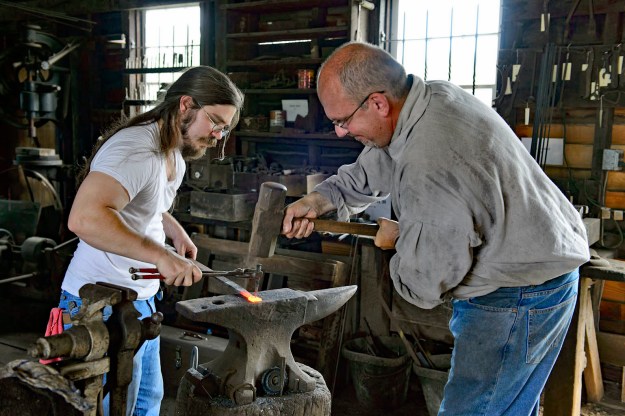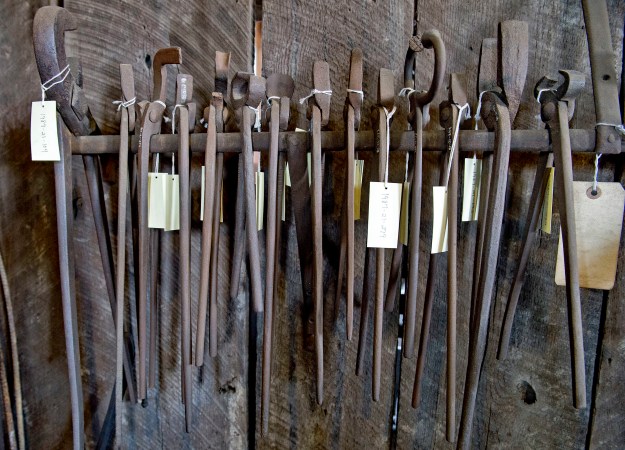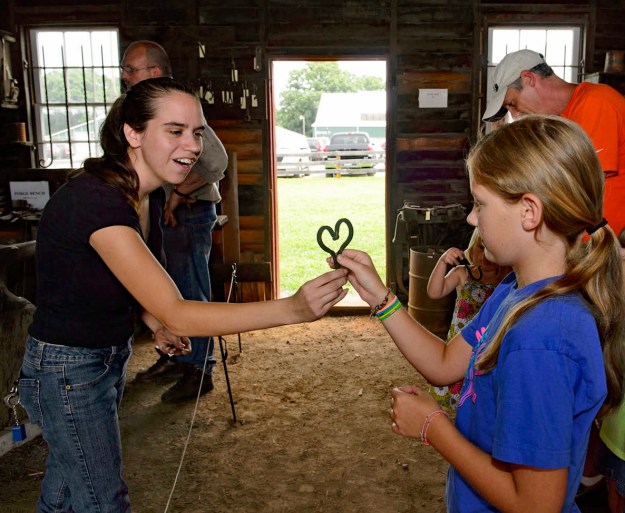 Tang! Tang! Tang! The sound of the blacksmith working at his forge once rang across the Fairfax County countryside. From the earliest days of the colonial period until well into the 20th century, blacksmiths were important members of Fairfax County communities. Each large plantation, neighborhood, and small town probably had at least one blacksmith, just as localities today have hardware stores and auto repair shops.
Tang! Tang! Tang! The sound of the blacksmith working at his forge once rang across the Fairfax County countryside. From the earliest days of the colonial period until well into the 20th century, blacksmiths were important members of Fairfax County communities. Each large plantation, neighborhood, and small town probably had at least one blacksmith, just as localities today have hardware stores and auto repair shops.
In the late 18th century, enslaved blacksmiths Sam and George worked at Sully, now Sully Historic Site, in western Fairfax County. From New York in 1789, Sully owner Richard Bland Lee inquired as to the probable success of establishing a shop, asking, “Am I likely to make anything of the Blacksmith’s shop?” About the same time, blacksmiths Nat and George, also enslaved, were working at George Washington’s Mount Vernon. Archaeological excavations have unearthed evidence of their brick forge and shop.
Other records about blacksmithing are numerous. In 1814, near Colvin Run Mill, Rezin Offutt willed a tract of land “where my blacksmith’s shop stood” to his children, and he willed “what blacksmith tools is on the plantation” to his wife, Mary. Years later, John W. Tracey, who also lived close to Colvin Run Mill, called himself a “Coach and Wagonmaker” on the 1884 Fairfax County census. By 1906, however, he was listed as a “Blacksmith, wheelwright, and farmer.”
 The skills required of the blacksmith were many. He crafted and repaired farm implements, domestic tools and firearms for himself and for the local community. As a wheelwright, he made and repaired wagon and carriage axles and wheels. As a farrier, he fashioned and fitted horseshoes.
The skills required of the blacksmith were many. He crafted and repaired farm implements, domestic tools and firearms for himself and for the local community. As a wheelwright, he made and repaired wagon and carriage axles and wheels. As a farrier, he fashioned and fitted horseshoes.
Henry Moffett (1898-1984) was a fifth-generation blacksmith. The first shop his family owned was in Leesburg. In 1904, Henry’s father purchased a lot in Herndon and built a new shop. That blacksmith shop burned in the Herndon fire of 1917. Attesting to the importance of smiths to communities they served, the shop was the first building in town to be rebuilt and the first to be wired for electricity.
Henry Moffett was the shop’s last owner. He served the needs of his rural community during a period of changing technology, from horse-drawn wagons to automobiles and from hand-operated machines and tools to electric devices. Besides repairing wagon tongues, mending plows and shoeing horses, Moffett sold coal, wood and stove equipment.
By 1955, there were not enough horses left to shoe, wagons to repair, or ironwork to be done to keep him in business. He closed the shop at the age of 68.
In 1975, the entire building was moved piece by piece and reassembled at Frying Pan Park. It became a permanent part of the county’s heritage, thus preserving the last known original blacksmith building in Fairfax County.
 Today, citizens and visitors visit this once-common element of the Fairfax County rural and town landscape. The art and skill of the blacksmith have not been lost, however, remaining present in horseshoe making and other iron work at the park and in traditional American folk art and contemporary architectural forms.
Today, citizens and visitors visit this once-common element of the Fairfax County rural and town landscape. The art and skill of the blacksmith have not been lost, however, remaining present in horseshoe making and other iron work at the park and in traditional American folk art and contemporary architectural forms.
The Moffett Blacksmith Shop is open for demonstrations during selected special events. Call Frying Pan Park at 703-437-9101 for further information. Colvin Run Mill Historic Site also hosts blacksmith demonstrations on select Sundays.
This article was originally written by former Fairfax County Park Authority Collections Manager Jeanne Niccolls.
